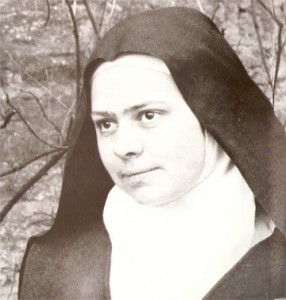Podcast: Play in new window | Download (Duration: 13:59 — 9.8MB) | Embed
Subscribe: Apple Podcasts | Spotify | Amazon Music | Android | Pandora | iHeartRadio | JioSaavn | Podchaser | Gaana | Podcast Index | Email | TuneIn | Deezer | Anghami | RSS | More
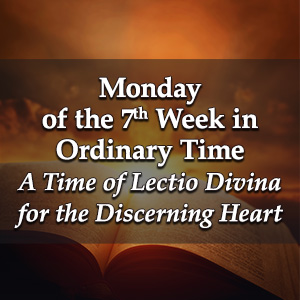 Monday of the Seventh Week in Ordinary Time – A Time of Lectio Divina for the Discerning Heart Podcast
Monday of the Seventh Week in Ordinary Time – A Time of Lectio Divina for the Discerning Heart Podcast
As you begin, take a deep breath and exhale slowly. For at least the next few moments, surrender all the cares and concerns of this day to the Lord.
Say slowly from your heart “Jesus, I Trust In You…You Take Over”
Become aware that He is with you, looking upon you with love, wanting to be heard deep within in your heart…
From the Holy Gospel of St. Mark 9:14-29
When Jesus, with Peter, James and John came down from the mountain and rejoined the disciples, they saw a large crowd round them and some scribes arguing with them. The moment they saw him the whole crowd were struck with amazement and ran to greet him. ‘What are you arguing about with them?’ he asked. A man answered him from the crowd, ‘Master, I have brought my son to you; there is a spirit of dumbness in him, and when it takes hold of him it throws him to the ground, and he foams at the mouth and grinds his teeth and goes rigid. And I asked your disciples to cast it out and they were unable to.’ ‘You faithless generation’ he said to them in reply. ‘How much longer must I be with you? How much longer must I put up with you? Bring him to me.’ They brought the boy to him, and as soon as the spirit saw Jesus it threw the boy into convulsions, and he fell to the ground and lay writhing there, foaming at the mouth. Jesus asked the father, ‘How long has this been happening to him?’ ‘From childhood,’ he replied ‘and it has often thrown him into the fire and into the water, in order to destroy him. But if you can do anything, have pity on us and help us.’ ‘If you can?’ retorted Jesus. ‘Everything is possible for anyone who has faith.’ Immediately the father of the boy cried out, ‘I do have faith. Help the little faith I have!’ And when Jesus saw how many people were pressing round him, he rebuked the unclean spirit. ‘Deaf and dumb spirit,’ he said ‘I command you: come out of him and never enter him again.’ Then throwing the boy into violent convulsions it came out shouting, and the boy lay there so like a corpse that most of them said, ‘He is dead.’ But Jesus took him by the hand and helped him up, and he was able to stand. When he had gone indoors his disciples asked him privately, ‘Why were we unable to cast it out?’ ‘This is the kind’ he answered ‘that can only be driven out by prayer.’
What word made this passage come alive for you?
What did you sense the Lord saying to you?
Once more give the Lord an opportunity to speak to you:
When Jesus, with Peter, James and John came down from the mountain and rejoined the disciples, they saw a large crowd round them and some scribes arguing with them. The moment they saw him the whole crowd were struck with amazement and ran to greet him. ‘What are you arguing about with them?’ he asked. A man answered him from the crowd, ‘Master, I have brought my son to you; there is a spirit of dumbness in him, and when it takes hold of him it throws him to the ground, and he foams at the mouth and grinds his teeth and goes rigid. And I asked your disciples to cast it out and they were unable to.’ ‘You faithless generation’ he said to them in reply. ‘How much longer must I be with you? How much longer must I put up with you? Bring him to me.’ They brought the boy to him, and as soon as the spirit saw Jesus it threw the boy into convulsions, and he fell to the ground and lay writhing there, foaming at the mouth. Jesus asked the father, ‘How long has this been happening to him?’ ‘From childhood,’ he replied ‘and it has often thrown him into the fire and into the water, in order to destroy him. But if you can do anything, have pity on us and help us.’ ‘If you can?’ retorted Jesus. ‘Everything is possible for anyone who has faith.’ Immediately the father of the boy cried out, ‘I do have faith. Help the little faith I have!’ And when Jesus saw how many people were pressing round him, he rebuked the unclean spirit. ‘Deaf and dumb spirit,’ he said ‘I command you: come out of him and never enter him again.’ Then throwing the boy into violent convulsions it came out shouting, and the boy lay there so like a corpse that most of them said, ‘He is dead.’ But Jesus took him by the hand and helped him up, and he was able to stand. When he had gone indoors his disciples asked him privately, ‘Why were we unable to cast it out?’ ‘This is the kind’ he answered ‘that can only be driven out by prayer.’
What did your heart feel as you listened?
What did you sense the Lord saying to you?
Once more, through Him, with Him and in Him listen to the Word:
When Jesus, with Peter, James and John came down from the mountain and rejoined the disciples, they saw a large crowd round them and some scribes arguing with them. The moment they saw him the whole crowd were struck with amazement and ran to greet him. ‘What are you arguing about with them?’ he asked. A man answered him from the crowd, ‘Master, I have brought my son to you; there is a spirit of dumbness in him, and when it takes hold of him it throws him to the ground, and he foams at the mouth and grinds his teeth and goes rigid. And I asked your disciples to cast it out and they were unable to.’ ‘You faithless generation’ he said to them in reply. ‘How much longer must I be with you? How much longer must I put up with you? Bring him to me.’ They brought the boy to him, and as soon as the spirit saw Jesus it threw the boy into convulsions, and he fell to the ground and lay writhing there, foaming at the mouth. Jesus asked the father, ‘How long has this been happening to him?’ ‘From childhood,’ he replied ‘and it has often thrown him into the fire and into the water, in order to destroy him. But if you can do anything, have pity on us and help us.’ ‘If you can?’ retorted Jesus. ‘Everything is possible for anyone who has faith.’ Immediately the father of the boy cried out, ‘I do have faith. Help the little faith I have!’ And when Jesus saw how many people were pressing round him, he rebuked the unclean spirit. ‘Deaf and dumb spirit,’ he said ‘I command you: come out of him and never enter him again.’ Then throwing the boy into violent convulsions it came out shouting, and the boy lay there so like a corpse that most of them said, ‘He is dead.’ But Jesus took him by the hand and helped him up, and he was able to stand. When he had gone indoors his disciples asked him privately, ‘Why were we unable to cast it out?’ ‘This is the kind’ he answered ‘that can only be driven out by prayer.’
What touched your heart in this time of prayer?
What did your heart feel as you prayed?
What do you hope to carry with you from this time with the Lord?
Our Father, who art in heaven,
hallowed be thy name.
Thy kingdom come.
Thy will be done on earth, as it is in heaven.
Give us this day our daily bread,
and forgive us our trespasses,
as we forgive those who trespass against us,
and lead us not into temptation,
but deliver us from evil.
Amen

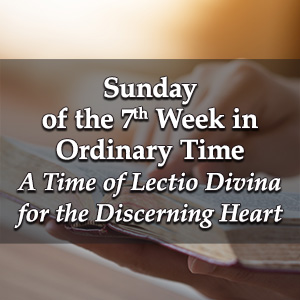 Sunday of the Seventh Week in Ordinary Time – A Time of Lectio Divina for the Discerning Heart Podcast
Sunday of the Seventh Week in Ordinary Time – A Time of Lectio Divina for the Discerning Heart Podcast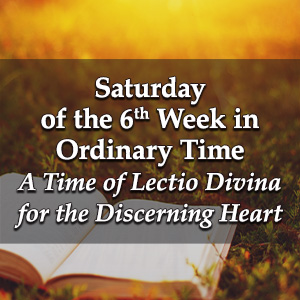 Saturday of the Sixth Week in Ordinary Time – A Time of Lectio Divina for the Discerning Heart Podcast
Saturday of the Sixth Week in Ordinary Time – A Time of Lectio Divina for the Discerning Heart Podcast
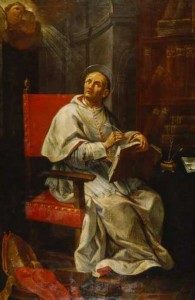
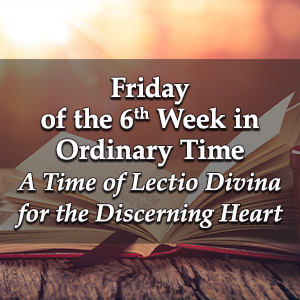 Friday of the Sixth Week in Ordinary Time – A Time of Lectio Divina for the Discerning Heart Podcast
Friday of the Sixth Week in Ordinary Time – A Time of Lectio Divina for the Discerning Heart Podcast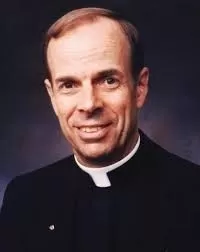
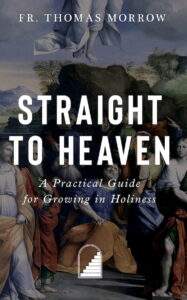
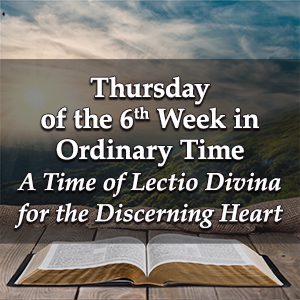 Thursday of the Sixth Week in Ordinary Time – A Time of Lectio Divina for the Discerning Heart Podcast
Thursday of the Sixth Week in Ordinary Time – A Time of Lectio Divina for the Discerning Heart Podcast


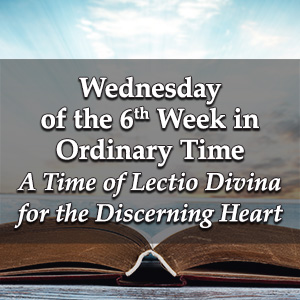 Wednesday of the Sixth Week in Ordinary Time – A Time of Lectio Divina for the Discerning Heart Podcast
Wednesday of the Sixth Week in Ordinary Time – A Time of Lectio Divina for the Discerning Heart Podcast
